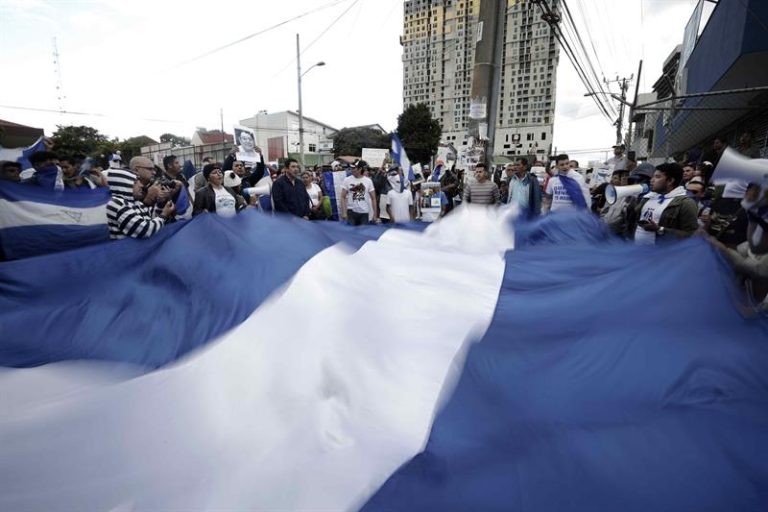
The Cuban Regime’s Punishment for Filming a Protest

PUBLICIDAD 1M
PUBLICIDAD 4D
PUBLICIDAD 5D
“Daniel Ortega is not giving any guarantees for those who are there in Nicaragua, much less for those who are in exile,” says activist.

Dozens of Nicaraguans who have had to flee to Costa Rica because of the sociopolitical crisis in their country, protest in front of the Nicaraguan embassy in San Jose. Photo: EFE / Confidencial
Nicaraguans exiled in Costa Rica, due to the political persecution of the Government of Daniel Ortega, distrust the offer of return by the regime, for lack of guarantees for the respect of human rights and civil liberties in the country. From June 2018 to date, at least 60,000 Nicaraguans have left the nation, fleeing from the official repression against the citizens’ rebellion, which erupted in April of that year.
Ana Quiros, former resident in Nicaragua and Director of the Center for Information and Advisory Services in Health (CISAS), believes that the Government’s proposal is simple propaganda. Quiros was abducted and summarily deported to Costa Rica.
“I think it is an unserious proposal, which is more propaganda than real. The situation of those who did return is complicated, because they are besieged, kidnapped and taken prisoners, thus there is no seriousness on the part of the Government,” she warns.
At the negotiation table between the regime and the Civic Alliance for Justice and Democracy, the government delegation presented, unilaterally, a voluntary return plan for exiles, who are mainly found in countries such as Costa Rica, Guatemala, Panama, Mexico, United States and Spain.
Speaking to governmental media outlets, Foreign Minister Dennis Moncada said in mid-May that “the consulates, missions and Embassies of Nicaragua will provide information and support to those who wish to return to Nicaragua within the framework of the voluntary return program for Nicaraguans abroad.” However, several people have been arrested and prosecuted upon their return to Nicaragua.
The former director of the agency “Hagamos Democracy” (Let’s do Democracy), Luciano Garcia, also in exile, believes that the Government’s proposal lacks credibility, as long as the de facto state of emergency persists.
“Ortega is not giving any protection for those who are there, much less for those who are in exile. We have heard of cases of people who have returned and have been arrested, in reality the regime is not complying with anything,” he denounced.
Three conditions to return
Miguel Lopez Baldizon, member of the Association of Nicaraguans Exiled in Costa Rica, enumerated at least three basic conditions for return.
The first, he assures, is to guarantee the annulment of all the trials against the released political prisoners. To date, almost 600 political prisoners have been released, but more than 80 are still in prison.
In addition, he added that “there are many exiles who already have a sentence or were tried in absence, without the right to due process, without the right to defense,” and he claims that “in those cases the annulment of the sentences and definitive dismissal is required for those exiles who have already received a conviction.”
The second condition raised by Baldizon is that workers unfairly dismissed, without any cause and who have not received their respective compensation, should be reinstated in the same conditions they had.
Likewise, he claimed as a third requirement that the expelled university students, whose academic records were also erased by the government-affiliated universities, must be reintegrated to the classrooms, in the same conditions as before April 18.
Exiled Students do not trust either
University student Madeleine Caracas, who during the first attempt at a national dialogue, in May 2018, read to Ortega the list of those killed (until then 58, which later rose to 325), believes that “there is not even one guarantee for the return of those of us who are here (in Costa Rica) for persecution, given that the police continue to exercise their functions alongside the paramilitaries.” According to Caracas, “there is no guarantee until the departure of Ortega.”
Another exiled young student, Lyris Solis, agrees that “there are no guarantees from the moment that the Government continues to persecute Nicaraguans who are trying to express themselves” and that also there are no guarantees “from the moment that armed people of the regime continue in the streets.”
Jocsan Espinoza, who is also an exiled student, notes that “the Government continues to fail to comply with the commitments.” In his opinion, a clear example is that illegal arrests and kidnappings of those who have demonstrated against the regime continue to be reported.
International accompaniment is demanded
Ana Quiroz, of CISAS, demanded as a guarantee for the return that the regime shows with concrete facts, beginning with the release of all political prisoners, the annulment of their trials, the restoration of public liberties, and the disarmament of the paramilitaries, as well as the accompaniment of international human rights organizations.
Quiroz proposes the accompaniment of organizations such as the Inter-American Commission of Human Rights (IACHR), the Office of the United Nations High Commissioner on Human Rights (OHCHR) and the High Commissioner on Human Rights for Refugees (UNHCR). In her opinion, without these organizations, it will be of little use to continue talking about return proposals in the air.
Luciano Garcia also considers that the guarantee of the regime must also have judicial support, so that the Police don’t justify that it abides by the pending accusations of those outside the country, and capture them upon their return to Nicaragua.
Won’t go back until Ortega leaves
A report by the Arias Foundation, of Costa Rica, on the situation of Nicaraguans exiles, entitled “From Repression to Exile” and published in May, revealed that eight out of ten Nicaraguans exiled in Costa Rica wish to return to the country. The only condition is that Ortega leaves power.
“As long as dictator Ortega does not leave, I cannot go to Nicaragua,” Jose Martinez, a Nicaraguan refugee in Costa Rica, told “Confidencial” and “Esta Semana.” For him, it is essential to guarantee “the disarmament of the paramilitaries and a law that protect us in order to make the decision to return.”
The once opposition councilman of Managua and conservative politician, Luciano Garcia, is not optimistic. Garcia sees Ortega’s permanence in power is only aggravating the crisis, and could generate a new wave of migration.
“If Ortega does not leave, Nicaragua will fall into a terrible economic crisis, the migratory problem will increase here (in Costa Rica), a very complicated phase. This country that very kindly opened its door to us is not prepared to receive a mass exodus of exiles,” Garcia commented.
Sanctions demanded
Miguel Lopez Baldizon says the international pressure against Ortega’s Government, including the sanctions against high officials of the regime, must be maintained.
From July 2018 to June 2019, the United States has sanctioned ten Ortega officials for their participation in the repression against citizens’ protests and human rights violations, including Ortega’s wife and Vice President Rosario Murillo, and the son of the dictatorial couple Laureano Ortega Murillo. The Government of Canada also recently sanctioned nine of these officials.
“These (sanctions) cannot be delayed any longer. We do not want to reach the situation of Venezuela with a deep economic crisis, greater number of exiles, with major destruction of the country,” warned Baldizon.
He further called on the international community to take concrete and real decisions, to hasten the regime’s departure, whom he considers has showed a genocidal vocation, without interest in opening a space for democracy.
Thank you for reading our English section, brought to you in collaboration with Havana Times. If you wish to subscribe to our English Weekly Newsletter, you can do it here. Please spread the word and share this link with your friends, family or contacts.
Regards,
Archivado como:
PUBLICIDAD 3M
PUBLICIDAD 3D